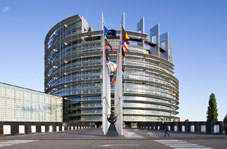
European Parliament Urges Tougher Sanctions on Georgian Government Over Democratic Backsliding
By Liza Mchedlidze
Thursday, July 10, 2025
The European Parliament has adopted a resolution calling on the European Union to consider further restrictive measures against the ruling Georgian Dream party and the Georgian government, citing severe democratic backsliding and increasing authoritarianism in the country.
The resolution urges the EU and its member states to explore measures such as cutting access to the SWIFT international banking system and imposing sectoral sanctions. According to the Parliament, these steps would target "the financial flows and sources of income of the Georgian Dream regime."
The resolution also calls for personal sanctions against Georgian Dream's political leaders, high-level government officials, and individuals deemed responsible for enabling the regime.
"We must act decisively to defend democracy in Georgia," said MEP Viola von Cramon, one of the resolution's co-sponsors. "The regime has clearly turned away from European values and is aligning itself with Russia, both in rhetoric and in practice."
The resolution condemns recent legislative changes passed without public consultation. These include a controversial "foreign agents" law and amendments that restrict freedom of assembly, limit media independence, and threaten civil society. The European Parliament argues these laws mirror policies used in Russia to silence dissent and control the public.
"These actions are not compatible with the values of the European Union," said MEP Michael Gahler. "They are designed to silence critics, criminalize NGOs, and dismantle the opposition."
The Parliament expressed concern over increasing pressure on non-governmental organizations. It pointed to demands by state institutions, including the Anti-Corruption Bureau, for extensive financial and operational data from NGOs within an unreasonably short deadline of three working days. The resolution warns that this could render many organizations paralyzed.
Despite growing threats, the European Parliament commended Georgian civil society groups for continuing to provide legal support, document human rights violations, and pursue accountability through domestic and international courts. It emphasized the urgent need to increase financial and logistical support for civil society, independent media, and human rights defenders in Georgia.
In a strong rebuke, the resolution considers the Georgian Dream government to have deliberately abandoned its EU integration path. The resolution reads that the party disregards democratic standards and international human rights laws, warning that the country is following a trajectory similar to that of Russia.
The Parliament also condemned anti-LGBT legislation adopted by the Georgian Parliament in October 2024, calling it a violation of the EU Charter of Fundamental Rights. It demanded the repeal of that law and the reinstatement of gender quotas removed earlier that year.
The resolution calls the EU's previous response insufficient, criticizing the Council and Commission for delayed and limited action. It encourages member states to act collectively or individually in imposing sanctions and stresses that a lack of unanimity must not prevent like-minded countries from responding.
Additionally, the European Parliament welcomed the European Council's decision to suspend visa-free travel for Georgian diplomats and officials. It described the move as a necessary first step and urged a review of Georgia's overall visa-free status with the EU, warning that suspension could follow if democratic standards continue to erode.
"The Georgian government must understand that it is solely responsible for the consequences of its actions," said MEP Petras Austrevicius. "Ordinary citizens, journalists, and human rights defenders must not be punished for the regime's choices. We must protect their right to travel, speak out, and seek safety if necessary."
The resolution calls for sanctions to remain in place until democratic order is restored in Georgia and urges continued support for those resisting authoritarianism from within. It welcomed existing sanctions by countries including Germany, the Baltic states, the Czech Republic, and international partners like the United States and Canada, urging others to follow suit.

